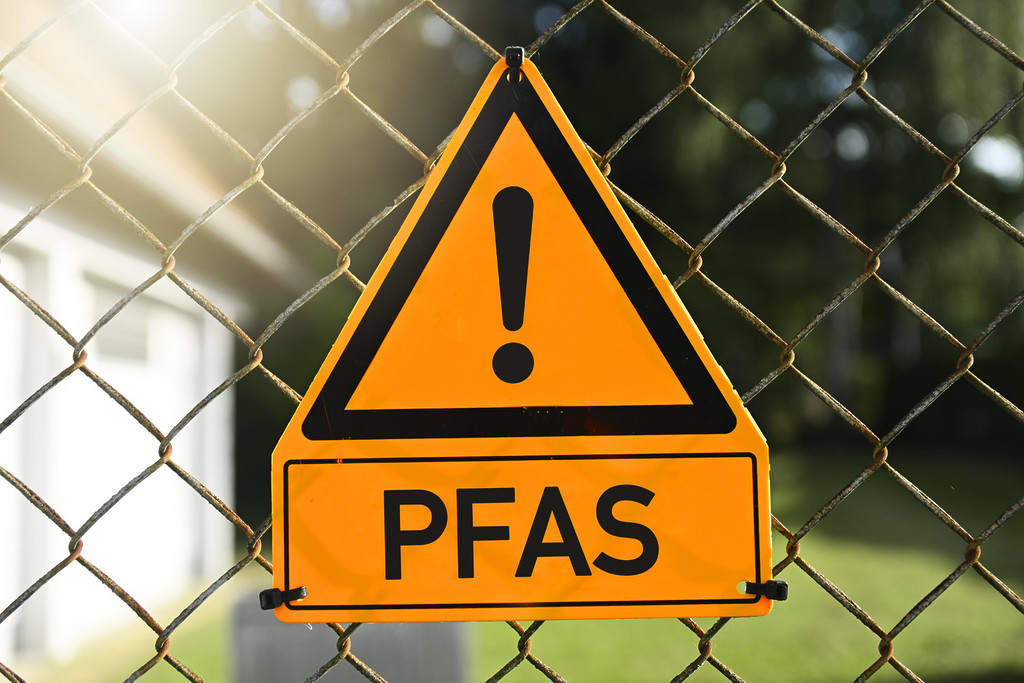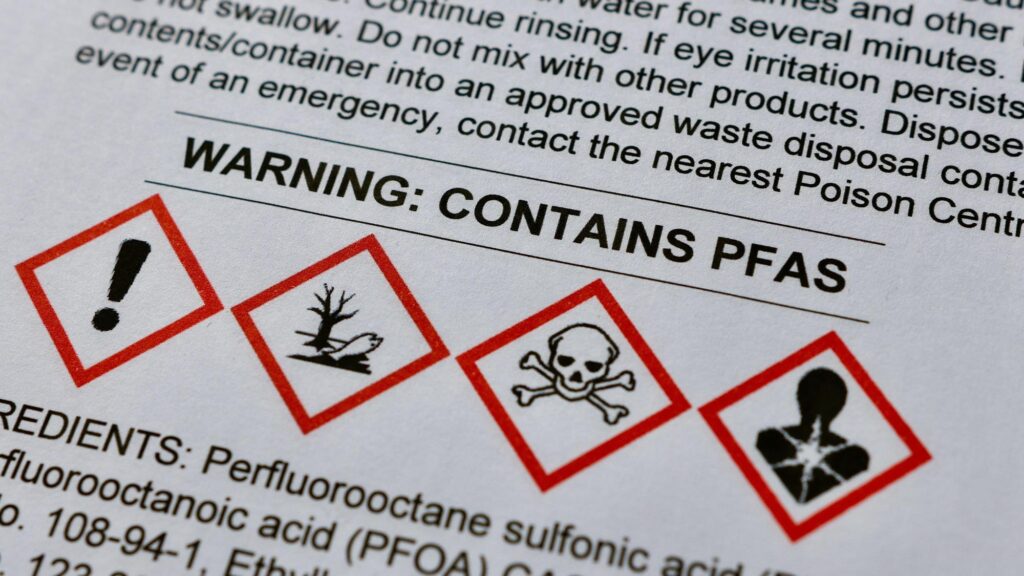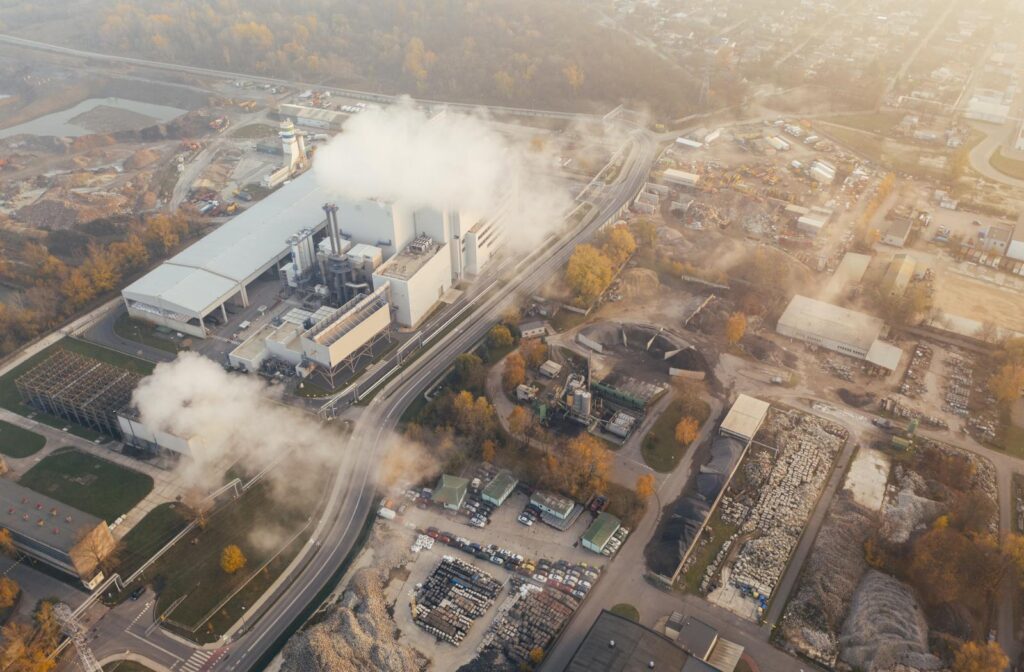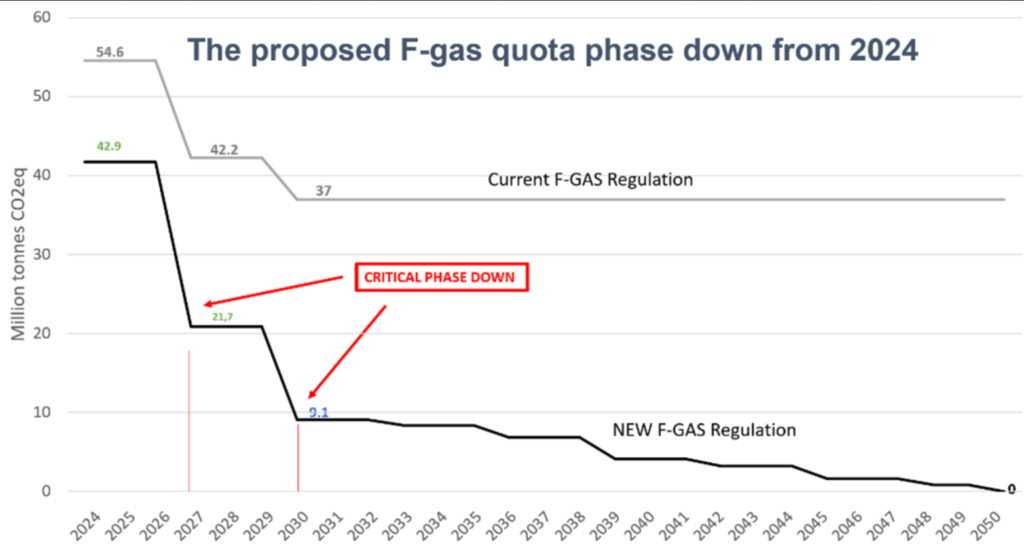Europe makes progress on conflicting PFAS ban and F-Gas phase-out regulations
- PostedPublished 14 December 2023
Proposals for a PFAS ban that conflicts with the finalisation of European Union F-Gas regulations have raised significant concerns among various stakeholders. Current drafts of these regulations pose a threat to global air-conditioning and refrigeration market as it works to integrate new-generation refrigerants and technologies aimed at combating climate change.

The proposed PFAS ban:
Known as ‘forever chemicals’, per- and polyfluoroalkyl substances (PFAS) found in many everyday products, including refrigerants, are facing bans in Europe and elsewhere over environmental and health concerns.
A PFAS ban would affect numerous HFC (hydrofluorocarbon) and HFO (hydrofluoroolefin) refrigerants that fall under the PFAS definition; these include R125, R134a, R143a, R227ea, R245fa, R365mzz, R1234yf, R1234ze, R1336mzz and R1233zd.
PFAS ban progress:
On January 13, 2023, five EU member states; Germany, the Netherlands, Norway, Sweden, and Denmark submitted a universal proposal to restrict PFAS to the European Chemicals Agency (ECHA).
On February 7, 2023, the ECHA announced its proposal to limit PFAS and initiated consultations on the proposals.
On March 22, 2023, the ECHA opened a six-month online consultation to gather a comprehensive understanding of the risks, socio-economic aspects, and alternative substances related to the proposed restriction on PFAS substances.
On April 5, 2023, an online information session conducted by the ECHA explained the restriction process, the proposal’s content, and provided guidance on how to engage in the consultation.
On September 25, 2023, the PFAS consultation closed. More than 4,400 organisations, companies, and individuals provided the ECHA scientific committee with over 5,600 comments. The ECHA insisted that only relevant evidence-based information would be considered in the opinion-making process and that it would remain open to scientific scrutiny.

Industry reaction:
In response to the PFAS consultation, the EPEE (European Partnership for Energy and the Environment), which represents the refrigeration, air-conditioning, and heat pump sectors in Europe, requested an exemption for F-Gases and fluoropolymers.
“We requested these time-unlimited derogations to avoid a significant loss of efficiency for key products in heating and cooling,” said EPEE director general Russell Patten.
“Further restrictions on the use of F-Gases and fluoropolymers would drastically slow the deployment of heat pumps, on which the EU depends to reach independence from Russian fossil fuels and to meet the climate target by 2030.”
EPEE and others agree there are currently no feasible substitutes for fluoropolymers that can match their level of safety and efficiency. EPEE also emphasises the suitability of fluoropolymers for the demanding operating conditions of RACHP (Refrigeration, Air Conditioning, and Heat Pump) equipment.
These materials are highly valued for their exceptional sealing capabilities, ability to withstand pressure and temperature, long-lasting nature, excellent electrical properties, and low friction characteristics.
“Fluoropolymers offer the safest way to transport refrigerants and avoid leakages of toxic and flammable gases. A ban on their use would mean returning to less efficient, less safe, older alternatives and would impact many European industries beyond the RACHP sector itself,” said EPEE.
The Research Council for Refrigeration Technology (FKT) in Germany issued a position statement that outlined the primary consequences of the proposed PFAS regulations for a range of critical infrastructure applications.

While acknowledging the importance of safeguarding human and environmental health against unrestricted chemical usage, FKT highlighted that a blanket prohibition on the entire PFAS group of substances would have ramifications for the manufacturing industry, including the refrigeration and heat pump sectors.
“Many of the materials used before 1950 have unacceptably high leakage rates or are no longer permitted because they do not meet modern safety standards (i.e., lead, asbestos). Alternatives to PFAS-containing materials that are capable of meeting the very high performance requirements now required are not available at present. Research to find suitable alternatives and the rigorous laboratory and field testing required to prove their suitability for practical use in refrigeration will take many years,” the FKT said in its statement.
“Without PFAS-containing materials the achievement of the European Green Deal would be questioned and put at risk.”
With the exception of five fluorinated refrigerants, FKT revealed that the PFAS ban would impact all others, which are already subject to stringent F-Gas regulations and limitations.
Raising concerns in response to the potential impact of the proposed PFAS bans on the use of “natural” refrigerants was the Association of European Refrigeration Component Manufacturers (ASERCOM),
“To progress with decarbonisation efforts within our industry, it is imperative to meticulously manage the entire PFAS dossier,” said ASERCOM president Marco Masini. “Transitioning to “natural” refrigerants necessitates even more the use of fluoropolymers, which are encompassed in this ban; hence, we are advocating for the introduction of exemptions for such materials.”
ASERCOM said in a statement that its members are actively working with their supply partners to explore alternative substances. However, they too have not yet identified viable solutions that can achieve the same level of performance.
ASERCOM PFAS team leader Heinz Juergensen emphasised that any mandate to replace PFAS elements in refrigerants would necessitate extensive redesigning and testing of compressor parts, as well as other key components and even entire systems.
“Employing alternative substances for different refrigerants would escalate the variety of components managed in production, wholesale, and installation sites,” said Dr Juergensen. “This could elevate the risks of failures and damages arising from improper selections.”
PFAS next steps:
The ECHA committees will meet to formulate a draft version of their opinions, which will be sent to the European Commission.
Although specific dates have not yet been provided, this lengthy process inadvertently offers industry additional time to further engage with policymakers.
EU F-Gas phase-out increasingly likely

F-Gases (fluorinated gases) widely used in refrigerants are now facing a faster, total phase out in the European Union by 2050, going much further than the global Montreal Protocol agreement for most developed nations to phase down production and use of HFCs to 85 per cent of baseline levels by 2036.
There is strong industry opposition that a phase out at the speed required by the EU is unrealistic.
F-Gas phase-down timeline:
On March 1, 2023 the Environment, Public Health, and Food Safety (ENVI) committee made a decision regarding the revision of EU laws on F-Gases. They proposed a shift away from fluorinated refrigerants in new cooling and heating systems by 2026.
On March 30, 2023 the European Parliament provisionally agreed to strengthen the F-Gas legislation, opting for a faster phase-down. They decided that by 2024, only 23.6 per cent of the amount of F-Gas used in 2015 would be allowed to be marketed. On a sloping trajectory, this would have fallen to 10 per cent by 2029 before steadily approaching zero by 2050. MEPs agreed they would postpone the deadline for the ban on new heat pumps containing HFCs until January 1, 2028, as well as pass a rule to relax repairing existing F-Gas systems such as air-conditioners.
On October 5, 2023 European authorities reached an agreement on the last set of proposals for reforming the F-Gas Regulation within the EU. These proposals, which still require approval from the European Parliament and European Council, aim to implement new restrictions on the use of specific refrigerants in the next decade where there are viable climate-friendly alternatives. The agreement included a greater allocation of quotas for the initial two periods compared to the Commission’s previous proposal.
Highlights of the updated ‘provisional’ F-Gas regulation:
- Phase-down of HFC production to a minimum of 15 per cent by 2036 and to 0 per cent by 2050
- Phase-out of common HFC refrigerants like R134a and R410A by 2030
- Ban on servicing refrigeration equipment using F-Gases with high GWP from 2025.
- Starting in 2027, there will be a ban on monobloc heat pumps and air conditioning systems with a capacity of under 12 kW that use F-Gas refrigerants with a global warming potential (GWP) exceeding 150. These F-Gas products will be entirely phased out in these applications.
- Ban from 2035 on split air conditioning systems and heat pumps that employ F-Gases. Earlier deadlines will be set for split systems that use refrigerants with higher GWP levels.
| Years | Maximum quantity in tonnes of CO2e |
|---|---|
| 2024-2026 | 42,874,410 |
| 2027-2029 | 21,665,691 |
| 2030-2032 | 9,132,097 |
| 2033-2035 | 8,445,713 |
| 2036-2038 | 6,782,265 |
| 2039-2044 | 6,136,732 |
| 2042-2044 | 5,491,199 |
| 2045-2047 | 4,845,666 |
| 2048 onwards | 4,200,133 |
I am extremely satisfied with the agreement that we reached today on fluorinated gases, which goes hand-in-hand with the work we have carried out on ozone-depleting substances. Such substances have highly negative impacts on the health of our planet and must be phased down.
Teresa Ribera Rodriguez, acting Spanish minister for ecological transition and demographic challenge
Some exemptions will be granted for specific cases where equipment must be used in accordance with safety requirements. These exemptions may limit the use of certain products with a specific level of flammability in certain applications.
Despite the efforts of a well-funded F-Gas industry lobby seeking to prolong unnecessary use of climate-harming HFCs, regulators have made the sensible choice, one which will allow European manufacturing to flourish.
Environment Investigation Agency UK climate team lead Clare Perry
Industry reaction:
EPEE, which represents the refrigeration, air-conditioning, and heat pump sectors in Europe, voiced its position on the F-Gas phase-down proposals.
“Enhanced containment measures, including leak checks and recovery and recycling procedures, will go a long way to support the HFC phase-down,” said EPEE director general Russell Patten.
“Unfortunately, unclear definitions and a complicated quota system add further uncertainty for equipment manufacturers, especially for heat pumps.” Mr Patten described the European Parliament as becoming “dogmatic in its insistence of a full F-Gas ban, including ultra low-GWP HFOs and their blends, that is not evidence-based”.
“Certainly some applications are appropriate for so-called ‘natural’ refrigerants, but not all, and an F-Gas ban will put decarbonisation opportunities at risk. This agreement will undoubtedly prolong our reliance on fossil fuels. We hope that as an industry we can be involved in the next steps to support an effective implementation.”
F-Gas agreement date:
The regulations, expected to be enforced starting January 1, 2024, will include bans on the marketing of specific products containing HFCs with a comprehensive review in 2040.
- CategoriesIn Latest News, SightGlass
- TagsF-Gas, HFC phase down, HFC phasedown, HFCs, PFAS, SightGlass News Issue 31

